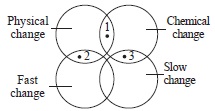Which of the following could be X, Y and Z?
| X | Y | Z | |
| A | Ostrich | Duck | Kiwi |
| B | Emu | Goose | Ostrich |
| C | Penguin | Duck | Emu |
| D | Kiwi | Swan | Penguin |
Which of the following could be X, Y and Z?
| X | Y | Z | |
| A | Ostrich | Duck | Kiwi |
| B | Emu | Goose | Ostrich |
| C | Penguin | Duck | Emu |
| D | Kiwi | Swan | Penguin |
The given set-up shows separation of impurities from water. Select the correct option for figure.

| Process | P | Q | |
| A | Distillation | Water + Salt | Pure water |
| B | Evaporation | Water + Mud | Mud |
| C | Filtration | Water + Salt | Pure water |
| D | Sublimation | Water + Sugar | Water |
Which of the following representation of the comet around the sun is correct?
A
B
C
D
Study the given Venn diagram.

Which of the following best represents points 1,
2 and 3?
| 1 | 2 | 3 | |
| A | Rusting of iron | Bursting of crackers | Curdling of milk |
| B | Burning of LPG in kitchen | Inflating a tyre | Cutting of trees |
| C | Germination of seeds | Melting of butter | Burning of paper |
| D | Burning of kerosene stove | Bursting of balloon | Ripening of fruits |